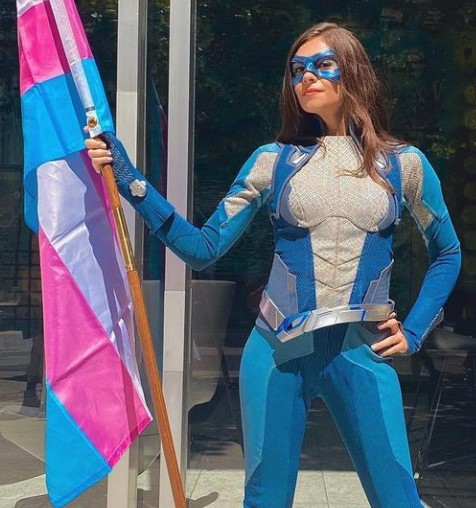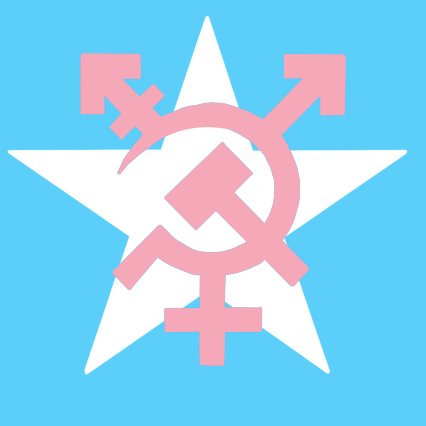A chairdre! It’s time once again to dig into the essay collection Transgender Marxism.
The PDF is here - https://transreads.org/wp-content/uploads/2021/07/2021-07-15_60f0b3d5edcb7_jules-joanne-gleeson-transgender-marxism-1.pdf
The intro discussion, which includes links to all essay discussions, is here - https://lemmygrad.ml/post/395378
Today we’ll be talking about the fifth essay in the collection, A Queer Marxist Transfeminism: Queer and Trans Social Reproduction by Nat Raha.
Nat Raha is a poet based in Edinburgh, who completed a PhD at the University of Sussex entitled ‘Queer Capital: Marxism in queer theory and post-1950 poetics’. Her current research investigates radical transfeminism, and race in UK poetry and poetics. She has performed her work internationally, and is the author of three collections and numerous pamphlets of poetry. Nat is co-editor of the Radical Trans-feminism zine.
As usual, I’ll be pulling quotes and taking notes.
Please, feel free to add your own thoughts, ideas, questions, comments. This is something I’m doing for a discussion group I lead in real life, but I am including my initial read-through and note-taking here as a way to spark a discussion, or share a little bit of knowledge.
At the very least, I hope we can all learn something together, or that someone will find having the PDF helpful <3
(I’m sleepy as heck today, so it’ll be a lot slower than usual, with frequent breaks, but I promise we’ll get through the whole essay)
Edit: the discussion continues with the essay by Virgínia Guitzel here - https://lemmygrad.ml/post/412487
The first bit is a list of concerns lesbian and bisexual women had during Thatcher’s time in office, most of which are unresolved today. Among them are such problems as being unable to support yourself or your family without a man’s wage, facing intersectional vectors of discrimination even among other marginalised communities, your relationship being unrecognised or deemed unnatural, dealing with discrimination in social programmes, the state removing your children from your care, being labelled a pervert, having to undergo a near endless process of “coming out” (this one still needs to be explained to straight people today, who tend to see coming out as one single moment in time. In actuality, it’s lifelong, where you are constantly having to come out over again in different contexts, with different people, with varying language).
Wages Due Lesbians supported the 1989 Counting Women’s Unremunerated Work Bill, which was pushed by the Time Off For Women campaign. The Bill was meant to address the large supply of unpaid labour that women performed and upon which the country’s economy relied.
“‘All government departments and other public bodies shall include in the production of statistics relating to the gross domestic product, a calculation of the contribution of women’s unremunerated work to the formal and informal sectors of the economy’.”
“by counting this unremunerated work undertaken by women in GDP, ‘no one will be able to continue to ignore the extent of dependence of the mighty institutions of the state, industry, commerce and every social organisation throughout the United Kingdom on women’s voluntary and involuntary unwaged work’.”
In Caliban and the Witch: Women, The Body and Primitive Accumulation, Silvia Federici asserted that the primitive accumulation during the transition to capitalism required the subjugation of women to a class of unpaid labourers, whereby their reproductive labour would uphold vast portions of the economy by ensuring the continued propagation and care of the waged labour class.
All women are exploited under this system, however for lesbians, without access to a man’s wage and with no ability to earn a livable wage on her own, this divide is felt most violently.
This is an inherent and purposeful part of the system of repression: by making women unable to live without the wage of a man, the system reinforces a woman’s place as an unpaid reproductive labourer. In order to survive, a woman must marry, care for, and reproduce for a man.
(This isn’t quite so true today, where assimilationist policies have extended some measure of entrance into the wage labour work force for queer people).
“Wages Due also produced a detailed analysis of the economic and social impact of Section 28 of the UK’s Local Government Act (1988), which banned promoting ‘the acceptability of homosexuality as a pretend family relationship’ in schools”
We are seeing literally the same repressive anti-queer legislation being pushed in the UK today.
Currently, however, there is a sharper concentration of wealth, so while such policies are receiving widespread pushback, they are funded by the very public and vocal wealthy elite (which is a direct contradiction to the spurious notion that queer rights is a bourgeois decadence that somehow manages to persist in certain leftist circles)
“In Barbara Leslett and Johanna Brenner’s often cited definition, social reproduction describes ‘[the] activities and attitudes, behaviours and emotions, responsibilities and relationships directly involved in the maintenance of life on a daily basis’.”
“Marxist feminism conceptualises socially reproductive labour as the work that reproduces both workers as living human entities and their labour power under capitalism.”
Silvia Federici (Wages Against Housework):
“‘To say that we want wages for housework is to expose the fact that housework is already money or capital, that capital has made and makes money out of our cooking, smiling, fucking’.”
(If you can’t tell, even though her analyses rarely ever touched upon queer issues and their relation to the subjugation of women as a labour class in relation to the means of reproduction, I love her writing dearly.)
“Women and feminised workers from the Global South (that is, workers of colour) are often responsible for the social reproduction of people in or from the Global North”
This happens through many ways, either through the vast expropriation of labour in offshored factories, mines, and sweatshops, which requires a massive labour force in the Global South whose reproduction and care is provided by women, or, more directly, through the very common occurrence of women from the Global South being hired on (underpaid if paid at all) as caretakers, nannies, nurses, housekeepers, maids, etc, of families in the Global North.
It’s also important to note that often you’ll see analyses of Marxist (and other intersectional) feminism that speaks of workers of colour as “feminised.” This is because during the transition to capitalism, when colonisers were accumulating wealth through the overwhelming exploitation of Black and Indigenous workers, the gender classes of “man” and “woman” weren’t extended to the exploited peoples as such.
Colonised women were expected to toil in the fields alongside colonised men, and colonised men were expected to cook and clean and provide other forms of reproductive labour alongside the women. In this way, it can be seen that the colonial classes of “man” and “women” were primarily crafted along racial lines of “whiteness” and as such people of colour were inherently feminised workers.
“the theoretical implications of queer positionality within, or more often than not exclusion from, the social factory of capitalist society remain absent. Correcting this would require the recognition of the particular burdens of socially reproductive labour placed upon queer and trans life.”
“Contemporary queer femme and trans cultures have addressed how the reproductive labour necessary for queer and trans communal survival falls disproportionately on certain femme/feminised, trans, poor, disabled people, sex workers, and/or people of colour”

